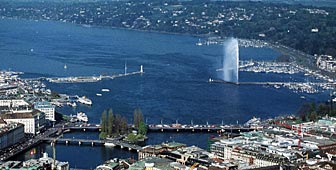Private banks face tough times ahead

The merger of Switzerland's oldest private banks comes amid growing pressure to consolidate in the face of competition from commercial banks.
Although billed as a merger, analysts say the tie-up between Geneva-based banks, Lombard Odier and Darier Hentsch, is more of a takeover of the latter, which is too small to survive in the long term.
“Darier Hentsch, in particular, had a size which was between the big ones like Lombard Odier and Pictet and the small ones. It was only a question of time,” says Dirk Schütz, editor-in-chief of the weekly “CASH” economics newspaper.
The new group will have combined assets of SFr140 billion ($89 billion), and will be called Lombard Odier Darier Hentsch & Cie, or LODH. The banks said the merger would allow them to achieve an optimum size “to compete against the ever-growing competition”.
The number of Swiss private banks has dwindled from 100 to about a dozen in the past half century, and although the survivors have outperformed larger rivals, such as UBS and Credit Suisse, their future is uncertain.
One reason is because bigger banks are becoming increasingly interested in the “elitist” sector – where clients must have at least SFr1 million to invest – as profits from retail banking dry up.
Pressure to merge
Smaller private banks are struggling to attract new business, and are facing increasing pressure to merge with rivals.
Indeed, takeover speculation has surrounded many smaller Swiss banks, including Bank Vontobel, which is thought to be seeking a merger partner. Earlier this year, the Basel-based Bank Sarasin sold a 28 per cent stake to Rabobank of the Netherlands, in what analysts say is a prelude to an eventual takeover by the Dutch bank.
Beyond increasing competition, Geneva’s private banks are up against a series of challenges, from weak equity markets, calls for tighter regulation of “offshore” banking centres, and soaring costs for information technology.
A key problem is raising money – traditional private banks operate as private partnerships, which means the partners shoulder unlimited liability. Analysts say this closed structure limits banks’ ability to grow rapidly, cut costs or tap the markets for cash.
Banks like Lombard Odier and Pictet have addressed these challenges by diversifying into pension and mutual fund management, enabling them to grow faster.
Offshore banking
Their smaller competitors, by contrast, are facing long-term decline in their traditional business of “offshore” banking.
“We are pursuing more aggressively than before on-shore developments,” especially in Europe, said Jacques Rossier, a managing partner with Darier Hentsch, on Monday.
The reason is because private banks worldwide are coming under pressure to be more transparent about their activities, as the European Union and the United States seek to clampdown on “offshore” financial centres, of which Switzerland is the biggest.
The EU is insisting that such centres reveal the income of EU citizens’ assets so it can tax them appropriately – a demand Switzerland is fiercely resisting. The US is concerned that “offshore” centres provide an easy way for terrorists to move funds, although it says it is happy with Switzerland’s system of checks and balances.
Swiss hold their own
Switzerland’s private banks between them control assets of around SFr400 billion, or one tenth of the total Swiss volume. Lombard Odier, Darier Hentsch and three other Genevan banks manage the lion’s share – SFr300 billion.
Dirk Schütz of “CASH” told swissinfo that the merger was proof of Switzerland’s strong position in the world of private banking.
“It shows that the Swiss players are still strong enough to find solutions within the country. They don’t need help from the outside. It’s better for the financial centre of Switzerland, and especially of Geneva, that two Geneva players are merging.”
swissinfo

In compliance with the JTI standards
More: SWI swissinfo.ch certified by the Journalism Trust Initiative
You can find an overview of ongoing debates with our journalists here. Please join us!
If you want to start a conversation about a topic raised in this article or want to report factual errors, email us at english@swissinfo.ch.